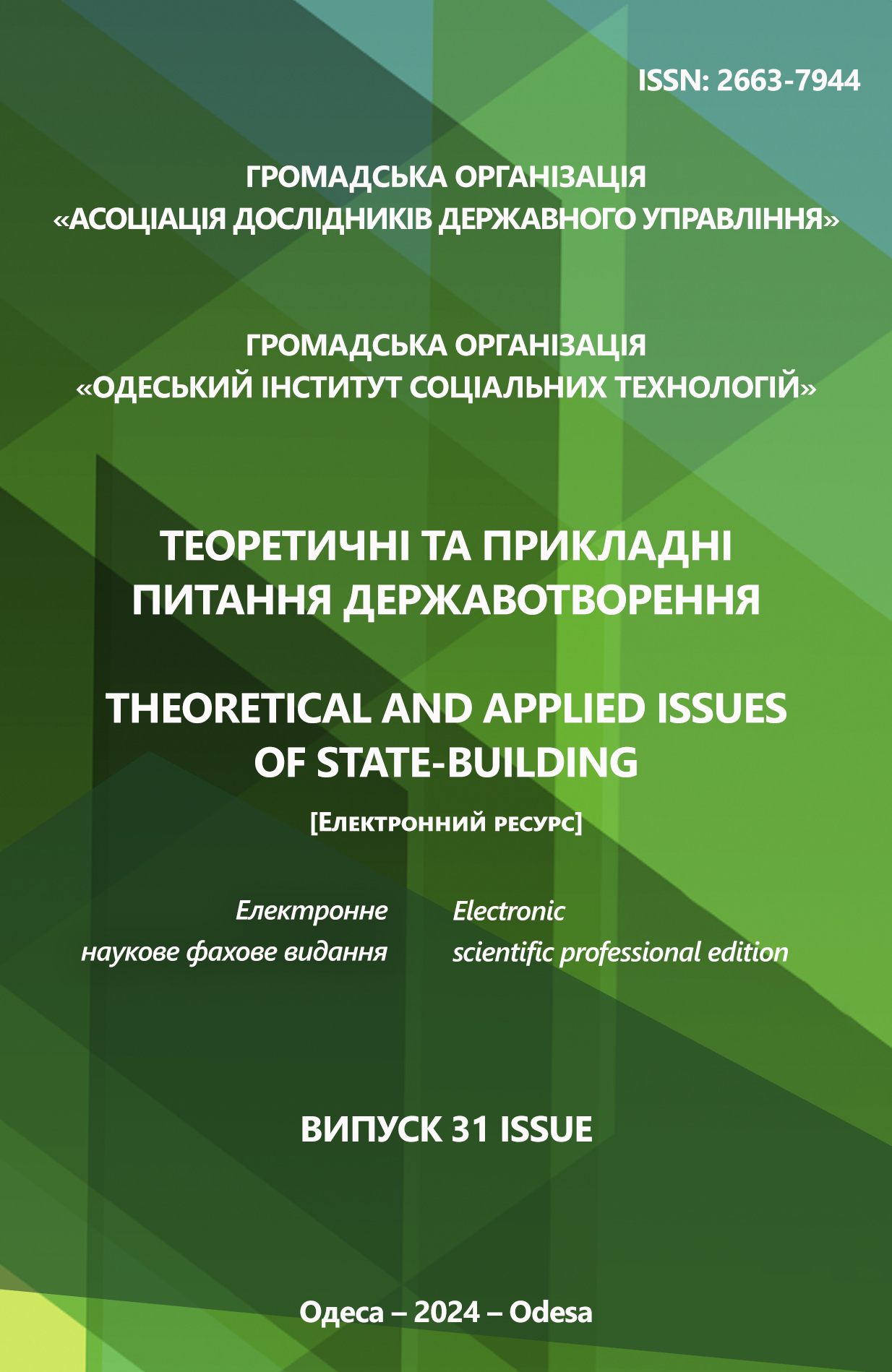ПОНЯТТЯ СТІЙКОСТІ СИСТЕМИ УПРАВЛІННЯ ОСВІТОЮ: ЗАРУБІЖНІ МОДЕЛІ ТА ПІДХОДИ ДО ВИЗНАЧЕННЯ
DOI:
https://doi.org/10.35432/tisb312024306538Ключові слова:
стійкість, ризик, невизначеність, стрес, криза, стійкість системи освіти, модель стійкостіАнотація
У статті обґрунтовується сутність феномену стійкості системи освіти та управління нею в сучасних кризових умовах шляхом уточнення її визначення та вивчення існуючих моделей. Зазначений концепт є надзвичайно складним, всі визначення мають як спільні характеристики, так і значні відмінності. Відмінність між визначеннями часто коріниться у конкретному підході або контексті, в якому вивчається стійкість. Термін «стійкість» загалом відноситься до тих факторів і процесів, які обмежують негативні поведінкові реакції, пов'язані зі стресом, і призводять до адаптивних результатів навіть в умовах негараздів. Розглядається одне з визначень освітньої стійкості, що широко використовується у західних джерелах. Звертається увага визначенням стійкості у психологічній літературі, де концепція стійкості використовується для опису трьох основних категорій явищ: дослідження індивідуальних відмінностей у відновленні після криз; опис осіб з високим ризиком; аналіз здатності адаптуватися, незважаючи на стрес. Розглядаються спроби інституціоналізації управління кризами та ризиками в освітніх системах за допомогою політики та механізмів координації. З огляду на те, що стійкість є здатністю окремих осіб, організацій і систем управляти загрозами, що спричинені неочікуваними зовнішніми подіями, заклади освіти розглядаються як оптимальне середовище для розвитку стійкості. Наостанок надається опис трьох загальних класів моделей стійкості: компенсаторна модель, захисна модель та модель викликів.
Посилання
. Освіта України в умовах воєнного стану. Інформаційно-аналітичний збірник. Київ 2022. 358 c. URL: https://mon.gov.ua/storage/app/media/zagalna%20serednya/serpneva-konferencia/2022/Mizhn.serpn.ped.nauk-prakt.konferentsiya/Inform-analityc.zbirn-Osvita.Ukrayiny.v.umovakh.voyennoho.stanu.22.08.2022.pdf
Невідкладні потреби освіти і науки України. Міністерство освіти і науки України. URL: https://mon.gov.ua/ua/ ministerstvo/diyalnist/mizhnarodna-dilnist/pidtrimka-osviti-i-nauki-ukrayini-pid-chas-vijni/nevidkladni-potrebi-osviti-inauki-ukrayini
Alvarado A. The effect of teacher strikes on academic achievement. Int. J. Educ. Dev. 82. 2021. URL: https://www.sciencedirect.com/journal/international-journal-of-educational-development/vol/82/suppl/C
Bacon N., Brophy M., Mguni N., Mulgan G., Shandro A. The State of Happiness: Can public policy shape people’s wellbeing and resilience? London: The Young Foundation. 2010. 56 p.
Cabinet Office 2010. Mindspace: Influencing Behaviour through Public Policy. London: Cabinet Office/Institute for Government. URL: https://www. instituteforgovernment.org.uk/sites/default/files/publications/MINDSPACE.pdf
Chen Y. Adverse childhood experiences and psychological well-being in Chinese college students: moderated mediation by gender and resilience.Front. Psychiatry. 2021. URL: https://www. frontiersin.org/journals/psychiatry/articles/10.3389/fpsyt.2021.710635/full
Conto A. Potential effects of COVID-19 school closures on foundational skills and Country responses for mitigating learning loss. Int. J. Educ. Dev. 2021. URL: https://www.sciencedirect.com/science/article/pii/S0738059321000870
Conz E., Magnani G. A dynamic perspective on the resilience of firms: Asystematic literature review and a framework for future research. European Management Journal, 38 (3). 2020. P. 400-412.
Fergus S., Zimmerman M. Adolescent resilience: A Framework for understanding health development in the face of risk. Annual Review of Public Health. 2005. 26. P. 399–419.
Garmezy N., Masten A. The protective role of competence indicators in children at risk. In E. Cummings, A. Greene, K. Karraker (Eds.), Life-span developmental psychology: Perspectives on stress and coping. Mahwah, NJ: Lawrence Erlbaum. 1991. P. 151-174.
Kay A., Zeeman L., Scholes J. The resilient subject: Exploring subjectivity, identity and the body in narratives of resilience. Health: An Inter-disciplinary Journal for the Social Study of Health, Illness and Medicine. 16 (5). 2012. P. 548-563.
Luthar S. Resilience in development: A synthesis of research across five decades. In: Cicchetti D, Cohen DJ, editors. Developmental Psychopathology: Risk, Disorder, and Adaptation. New York: Wiley. 2006. P. 740–795.
Mason М. Complexity Theory and the Philosophy of Education. Malden, MA: Wiley-Blackwell. 2008. 252 р.
Masten A. Ordinary magic: Resilience processes in development. American Psychologist. 2001. 56 (3). P. 227–238.
Masten A. Educational risks for children experiencing homelessness. J. Sch. Psychol. Volume 35. Issue 1. Spring 1997. P. 27-46.
Morrison К. School Leadership and Complexity Theory. EBook. Published 2 May 2002. Pub. Location London Imprint Routledge.240 р.
Pinkney Sh., Walker G. It was me, but it was them that helped me’: Exploring the issues for care experienced young people within higher education. Children and Youth Services Review. Volume 108. January 2020. P. 104-576.
Pontuschka R., Kan S., Dreesen Th. Reopening with Resilience: Lessons from remote learning during COVID-19 – Eastern and Southern Africa. UNICEF Office of Research – Innocenti, Florence, Italy. 2022. 16 p.
Rutter M. Environmentally mediated risks for psychopathology: Research strategies and findings. Journal of the American Academy of Child and Adolescent Psychiatry. 2005. 44 (1). P. 3–18.
Wang M., Haertel G., Walberg H. Educational resilience in inner cities. In M. Wang, E. Gordon (Eds.), Educational resilience in inner-city America: Challenges and prospects. Mahwah, NJ: Lawrence Erlbaum. 1994. P. 45-72.
Weick K. The Collapse of Sensemaking in Organizations: The Mann Gulch Disaster. Administrative Science Quarterly. Vol. 38. No. 4. Dec. 1993. P. 628-652.
Werner E. Resilience in development. Current Directions in Psychological Science. 1995. 4 (3). P. 81–85.
What’s Next? Lessons on Education Recovery: Findings from a survey of ministries of education amid the COVID-19 pandemic. UNESCO/UNICEF/ World Bank/OECD. Paris/New York/Washington, D.C. June 2021. URL: https://www.oecd-ilibrary.org/docserver/697bc36e-en.pdf?expires=1709740933&id=id&accname=guest&checksum=0C05CA993334CF66A8639054DE55286B
Wolin S., Wolin S. The resilient self: How survivors of troubled families rise above adversity. New York: Villard. 1993. 238 p.
##submission.downloads##
Опубліковано
Номер
Розділ
Ліцензія
Автори, які публікуються у цьому журналі, погоджуються з наступними умовами:Автори залишають за собою право на авторство своєї роботи та передають журналу право першої публікації цієї роботи на умовах ліцензії Creative Commons Attribution License, котра дозволяє іншим особам вільно розповсюджувати опубліковану роботу з обов'язковим посиланням на авторів оригінальної роботи та першу публікацію роботи у цьому журналі.
Автори мають право укладати самостійні додаткові угоди щодо неексклюзивного розповсюдження роботи у тому вигляді, в якому вона була опублікована цим журналом (наприклад, розміщувати роботу в електронному сховищі установи або публікувати у складі монографії), за умови збереження посилання на першу публікацію роботи у цьому журналі.
Політика журналу дозволяє і заохочує розміщення авторами в мережі Інтернет (наприклад, у сховищах установ або на особистих веб-сайтах) рукопису роботи, як до подання цього рукопису до редакції, так і під час його редакційного опрацювання, оскільки це сприяє виникненню продуктивної наукової дискусії та позитивно позначається на оперативності та динаміці цитування опублікованої роботи (див. The Effect of Open Access).

